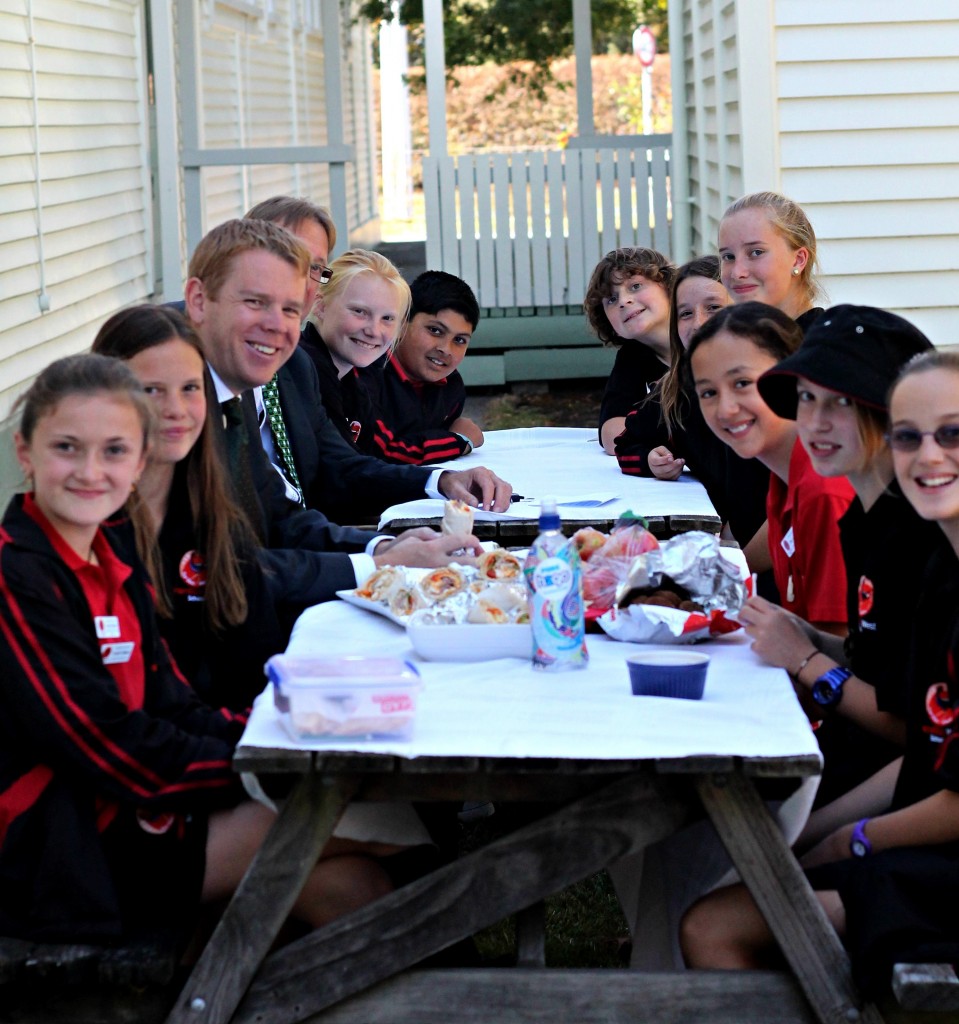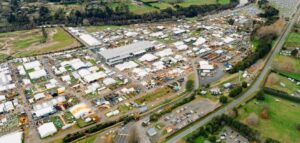Students quiz Labour MP Chris Hipkins
A handful of Hamilton primary students questioned Labour MP Chris Hipkins about the future of their education.
A handful of Hamilton West primary students had lunch with MP Chris Hipkins, Labour’s spokesman for education, on Tuesday.
Over sandwiches and apples, the group of 10 students, along with principal Mark Penman, asked questions regarding what a Labour government would do for schools.

Photo: Alyson Eberle
Ella, a year eight student, asked about the growing obesity problem with students and a current lack of physical education teachers in schools.
“The last time Labour government was in office we went around to schools and removed all the junk food and that is something that we want to do again,” said Hipkins.
Along with eliminating junk food, a Labour government is also looking at setting money aside for “a released time programme” with hopes for more schools to have physical education teachers. “We certainly want children running around doing exercise” said Hipkins.
“Will National Standards change?” asked Molly, a year eight student.
“Yes. We [Labour] will abolish national standards, so you won’t have to do them any more. And the reason is because we want to make sure that within all of the schools, students are doing a whole range of subjects. Everything from reading, writing, and maths, but we also want students to be doing art, physical education, and science,” said Hipkins.
“All of those things are important and so we’ve said no, we won’t do national standards any more, because we don’t want schools only teaching reading, writing, and maths- we want them also doing a whole lot of other important things as well.”
“We were pleased to hear that,” said principal Penman.
Year seven student Matt asked about the comparisons between New Zealand education systems and those in other countries.
“I think the New Zealand education system is really good,” said Hipkins. “A comparison of New Zealand schools to most schools around the world shows that most Kiwi kids are at the top. We are doing better than most countries but there is a small group of New Zealand kids who aren’t doing very well and the gap is larger than in other countries. But one of the reasons for that is economic inequality.”
“Do you think there is significant amount funding for the arts?” asked Taylah, a year eight student.
“I don’t think there is enough emphasis on the arts in schools at the moment. That’s because the government is saying to schools we are only going to rank these schools on performance, only based on where they are teaching: reading, writing, and maths. And I don’t think that is right, I think we should be focusing on arts and science and all the other things also. I don’t necessarily think it’s a question of money, I think it’s a question for the government to say that we also want schools to value those things as well.”
After a few more questions about favourite subjects and a debate on a ‘less homework’ policy, Matt asked “What inspired you to have this job?”
“I ultimately decided to run for parliament because I wanted to make sure every kid could have the opportunities that I had. I was quite fortunate to have parents who could afford to pay for things my brother and I needed, but we went to a poor school and some of the parents couldn’t afford a lot of those things for their kids and so they didn’t get all the opportunities that we had.”
After lunch the students took Hipkins on a tour of their school grounds and told him about the history of Hamilton West Primary before the bell rang signalling lunch was over.
“We hope you win,” shouted Ella as the students walked back their classrooms.
Earlier in the day Hipkins, along with Hamilton-based Labour MP Sue Moroney, attended a public meeting at Plunket to discuss plans for early development care and funding.
Labour’s Best Start policy targets middle and lower income families, with newborns, who would be eligible to receive a weekly payment of $60 for the first 12 months of their child’s life.
Along with the policy, a Labour government also has plans to extend the paid parental leave from its current 14 weeks to 26 weeks by 2017.




